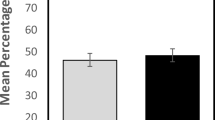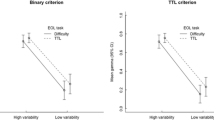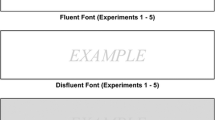Abstract
The ways in which adult learners study information influences their judgment-of-learning (JOL) accuracy (e.g., Koriat et al. Journal of Experimental Psychology: General, 131(2), 147-162, 2002). The present study extends this investigation to adolescent children to determine whether developing learners’ metacognitive monitoring is similarly influenced by different study techniques. In two experiments, we examined JOL accuracy in adolescent children (ages 11 to 12) and college-aged adults. Across both experiments, we employed a standard delayed-JOL paradigm in which three groups of participants, differing in type of study technique, encoded weakly-related word pairs. One group studied the word pairs twice (study practice). A second group studied with the instruction to generate a word that linked the two members of the word pair together (elaborative encoding). The final group studied word pairs and then took an immediate cued-recall test with feedback (retrieval practice). In children and adults, retrieval practice led to better JOL accuracy as compared to study practice. Children differed from adults in how elaborative encoding influenced JOL accuracy. For adults, elaborative encoding resulted in better JOL accuracy than study practice; however, for children, JOL accuracy did not differ between the two groups. Our results suggest that encoding processes influence delayed-JOL accuracy in both age-groups.


Similar content being viewed by others
References
Begg, I., Duft, S., Lalonde, P., Melnick, R., & Sanvito, J. (1989). Memory predictions are based on ease of processing. Journal of Memory and Language, 28(5), 610–632.
Beuhring, T., & Kee, D. W. (1987a). Elaborative Propensities During Adolescence: The Relationships Among Memory Knowledge, Strategy Behavior, and Memory Performance. In M. A. McDaniel & M. Pressley (Eds.), Imagery and Related Mnemonic Processes. New York: Springer.
Beuhring, T., & Kee, D. W. (1987b). Developmental relationships among metamemory, elaborative strategy use, and associative memory. Journal of Experimental Child Psychology, 44(3), 377–400.
Brewer, G. A., Marsh, R. L., Clark-Foos, A., & Meeks, J. T. (2010). Noncriterial recollection influences metacognitive monitoring and control processes. The Quarterly Journal of Experimental Psychology, 63(10), 1936–1942.
Carpenter, S. K. (2009). Cue strength as a moderator of the testing effect: The benefits of elaborative retrieval. Journal of Experimental Psychology: Learning, Memory, and Cognition, 35(6), 1563–1569.
Carpenter, S. K. (2011). Semantic information activated during retrieval contributes to later retention: Support for the mediator effectiveness hypothesis of the testing effect. Journal of Experimental Psychology: Learning, Memory, and Cognition, 37(6), 1547–1552.
Cohen, J. (1988). Statistical power analysis for the behavioral sciences (2nd ed.). Hillsdale: Erlbaum.
Cook, G. I., Marsh, R. L., & Hicks, J. L. (2006). Source memory in the absence of successful cued recall. Journal of Experimental Psychology: Learning, Memory, and Cognition, 32(4), 828–835.
Daniels, K. A., Toth, J. P., & Hertzog, C. (2009). Aging and recollection in the accuracy of judgments of learning. Psychology and Aging, 24(2), 494–500.
Dunlosky, J., & Nelson, T. O. (1994). Does the sensitivity of judgments of learning (JOLs) to the effects of various study activities depend on when the JOLs occur? Journal of Memory and Language, 33(4), 545–565.
Dunlosky, J., Hertzog, C., & Powell-Moman, A. (2005). The contribution of mediator-based deficiencies to age differences in associative learning. Developmental Psychology, 41(2), 389–400.
Finn, B., & Metcalfe, J. (2014). Overconfidence in children's multi-trial judgments of learning. Learning and Instruction, 32, 1–9.
Hertzog, C., Fulton, E. K., Sinclair, S. M., & Dunlosky, J. (2014). Recalled aspects of original encoding strategies influence episodic feelings of knowing. Memory & Cognition, 42(1), 126–140.
Hoffmann-Biencourt, A., Lockl, K., Schneider, W., Ackerman, R., & Koriat, A. (2010). Self-pace study time as a cue for recall predictions across school age. British Journal of Developmental Psychology, 28(4), 767–784.
Isingrini, M., Sacher, M., Perrotin, A., Taconnat, L., Souchay, C., Stoehr, H., & Bouazzaoui, B. (2016). Episodic feeling-of-knowing relies on noncriterial recollection and familiarity: Evidence using an online remember-know procedure. Consciousness and Cognition: An International Journal, 41, 31–40.
Jang, Y., Wallsten, T. S., & Huber, D. E. (2012). A stochastic detection and retrieval model for the study of metacognition. Psychological Review, 119(1), 186–200.
Karpicke, J. D. (2009). Metacognitive control and strategy selection: Deciding to practice retrieval during learning. Journal of Experimental Psychology: General, 138(4), 469–486.
King, J. F., Zechmeister, E. B., & Shaughnessy, J. J. (1980). Judgments of knowing: The influence of retrieval practice. The American Journal of Psychology, 93(2), 329–343.
Koriat, A. (1997). Monitoring one's own knowledge during study: A cue-utilization approach to judgments of learning. Journal of Experimental Psychology: General, 126(4), 349–370.
Koriat, A., & Shitzer-Reichert, R. (2002). Metacognitive judgments and their accuracy. In P. Chambres, M. Izaute, & P. Marescaux (Eds.), Metacognition: Process, function and use (pp. 1–17). Dordrecht: Kluwer Academic Publishers.
Koriat, A., Sheffer, L., & Ma'ayan, H. (2002). Comparing objective and subjective learning curves: Judgments of learning exhibit increased underconfidence with practice. Journal of Experimental Psychology: General, 131(2), 147–162.
Koriat, A., Ma'ayan, H., Sheffer, L., & Bjork, R. A. (2006). Exploring a mnemonic debiasing account of the underconfidence-with-practice effect. Journal of Experimental Psychology: Learning, Memory, and Cognition, 32(3), 595–608.
Koriat, A., Ackerman, R., Lockl, K., & Schneider, W. (2009). The easily learned, easily remembered heuristic in children. Cognitive Development, 24(2), 169–182.
Lehman, M., Smith, M. A., & Karpicke, J. D. (2014). Toward an episodic context account of retrieval-based learning: Dissociating retrieval practice and elaboration. Journal of Experimental Psychology: Learning, Memory, and Cognition, 40(6), 1787–1794.
Leonesio, R. J., & Nelson, T. O. (1990). Do different metamemory judgments tap the same underlying aspects of memory? Journal of Experimental Psychology: Learning, Memory, and Cognition, 16(3), 464–470.
Lovelace, E. A. (1984). Metamemory: Monitoring future recallability during study. Journal of Experimental Psychology: Learning, Memory, and Cognition, 10(4), 756–766.
Mazzoni, G., Cornoldi, C., & Marchitelli, G. (1990). Do memorability ratings affect study-time allocation? Memory & Cognition, 18(2), 196–204.
McCabe, D. P., & Soderstrom, N. C. (2011). Recollection-based prospective metamemory judgments are more accurate than those based on confidence: Judgments of remembering and knowing (JORKS). Journal of Experimental Psychology: General, 140(4), 605–621.
Meeter, M., & Nelson, T. O. (2003). Multiple study trials and judgments of learning. Acta Psychologica, 113(2), 123–132.
Metcalfe, J. (2009). Metacognitive judgments and control of study. Current Directions in Psychological Science, 18(3), 159–163.
Metcalfe, J., & Finn, B. (2013). Metacognition and control of study choice in children. Metacognition and Learning, 8(1), 19–46.
Nelson, T. O., & Dunlosky, J. (1991). When people's judgments of learning (JOLs) are extremely accurate at predicting subsequent recall: The "delayed-JOL effect.". Psychological Science, 2(4), 267–270.
Nelson, T. O., & Narens, L. (1990). Metamemory: A theoretical framework and new findings. In G. H. Bower (Ed.), Psychology of learning and motivation (Vol. 26, pp. 125–173). New York: Academic Press.
Nelson, T. O., & Narens, L. (1994). Why investigate metacognition? In J. Metcalfe & A. P. Shimamura (Eds.), Metacognition: Knowing about knowing (pp. 1–25, Chapter xiii, 334 Pages)). Cambridge: The MIT Press.
Nelson, D. L., McEvoy, C. L., & Schreiber, T. A. (1998). The University of South Florida Word Association, Rhyme, and Word Fragment Norms.
Nelson, T. O., Narens, L., & Dunlosky, J. (2004). A revised methodology for research on metamemory: Pre-judgment recall and monitoring (PRAM). Psychological Methods, 9(1), 53–69.
Parks, C. M. (2007). The role of noncriterial recollection in estimating recollection and familiarity. Journal of Memory and Language, 57(1), 81–100.
Peynircioğlu, Z. F., Brandler, B. J., Hohman, T. J., & Knutson, N. (2014). Metacognitive judgments in music performance. Psychology of Music, 42(5), 748–762.
Pressley, M., Levin, J. R., & Ghatala, E. S. (1984). Memory strategy monitoring in adults and children. Journal of Verbal Learning & Verbal Behavior, 23(2), 270–288.
Pyc, M. A., & Rawson, K. A. (2010). Why testing improves memory: Mediator effectiveness hypothesis. Science, 330(6002), 1–335.
Pyc, M. A., Rawson, K. A., & Aschenbrenner, A. J. (2014). Metacognitive monitoring during criterion learning: When and why are judgments accurate? Memory & Cognition, 42(6), 886–897.
Rhodes, M. G. (2016). Judgments of learning: Methods, data, and theory. In J. Dunlosky & S. K. Tauber (Eds.), The oxford handbook of metamemory (pp. 65–80). New York: Oxford University Press.
Rhodes, M. G., & Tauber, S. K. (2011). The influence of delaying judgments of learning on metacognitive accuracy: A meta-analytic review. Psychological Bulletin, 137(1), 131–148.
Roebers, C. M., von der Linden, N., Schneider, W., & Howie, P. (2007). Children's metamemorial judgments in an event recall task. Journal of Experimental Child Psychology, 97(2), 117–137.
Schneider, W., Visé, M., Lockl, K., & Nelson, T. O. (2000). Developmental trends in children’s monitoring: Evidence from a judgment-of-learning. Cognitive Development, 15, 115–134.
Schneider, W., Eschman, A., & Zuccolotto, A. (2002). E-Prime: User's guide. Pittsburgh: Psychology Software Tools.
Schwartz, B. L., & Metcalfe, J. (1994). Methodological problems and pitfalls in the study of human metacognition. In J. Metcalfe & A. P. Shimamura (Eds.), Metacognition: Knowing about knowing (pp. 93–113, Chapter xiii, 334 Pages)). Cambridge: The MIT Press.
Shaughnessy, J. J., & Zechmeister, E. B. (1992). Memory-monitoring accuracy as influenced by the distribution of retrieval practice. Bulletin of the Psychonomic Society, 30(2), 125–128.
Thiede, K. W. (1999). The importance of monitoring and self-regulation during multitrial learning. Psychonomic Bulletin & Review, 6(4), 662–667.
Thiede, K. W., & Dunlosky, J. (1994). Delaying students' metacognitive monitoring improves their accuracy in predicting their recognition performance. Journal of Educational Psychology, 86(2), 290–302.
Thiede, K. W., Anderson, M. C. M., & Therriault, D. (2003). Accuracy of metacognitive monitoring affects learning of texts. Journal of Educational Psychology, 95(1), 66–73.
Thomas, A. K., & McDaniel, M. A. (2007). Metacomprehension for educationally relevant materials: Dramatic effects of encoding-retrieval interactions. Psychonomic Bulletin & Review, 14(2), 212–218.
Thomas, A. K., Bulevich, J. B., & Dubois, S. J. (2011). Context affects feeling-of-knowing accuracy in younger and older adults. Journal of Experimental Psychology: Learning, Memory, and Cognition, 37(1), 96–108.
Thomas, A. K., Bulevich, J. B., & Dubois, S. J. (2012). An analysis of the determinants of the feeling of knowing. Consciousness and Cognition: An International Journal, 21(4), 1681–1694.
Tsalas, N., Paulus, M., & Sodian, B. (2015). Developmental changes and the effect of self-generated feedback in metacognitive controlled spacing strategies in 7-year-olds, 10-year-olds, and adults. Journal of Experimental Child Psychology, 132, 140–154.
Tullis, J. G., Finley, J. R., & Benjamin, A. S. (2013). Metacognition of the testing effect: Guiding learners to predict the benefits of retrieval. Memory & Cognition, 41(3), 429–442.
Undorf, M., Böhm, S., & Cüpper, L. (2016). Do judgments of learning predict automatic influences of memory? Journal of Experimental Psychology: Learning, Memory, and Cognition, 42(6), 882–896.
van Loon, M. H., de Bruin, A. B. H., van Gog, T., & van Merriënboer, J. J. G. (2013). The effect of delayed-JOLs and sentence generation on children’s monitoring accuracy and regulation of idiom study. Metacognition and Learning, 8(2), 173–191.
van Loon, M., de Bruin, A., Leppink, J., & Roebers, C. (2017). Why are children overconfident? developmental differences in the implementation of accessibility cues when judging concept learning. Journal of Experimental Child Psychology, 158, 77–94.
von der Linden, N., Löffler, E., & Schneider, W. (2015). Effects of a short strategy training on metacognitive monitoring across the life-span. Frontline Learning Research, 3(4), 36–55.
Weaver, C. A., & Kelemen, W. L. (2003). Processing similarity does not improve metamemory: Evidence against transfer-appropriate monitoring. Journal of Experimental Psychology: Learning, Memory, and Cognition, 29(6), 1058–1065.
Whiffen, J. W., & Karpicke, J. D. (2017). The role of episodic context in retrieval practice effects. Journal of Experimental Psychology: Learning, Memory, and Cognition, 43(7), 1036–1046.
Acknowledgements
The authors would like to thank John Kitzmiller, a mathematics educator at the Frances C. Richmond Middle School at Hanover, NH.
Author information
Authors and Affiliations
Corresponding author
Ethics declarations
Conflict of interest
The authors declare that they have no conflict of interest.
Rights and permissions
About this article
Cite this article
Hughes, G.I., Taylor, H.A. & Thomas, A.K. Study techniques differentially influence the delayed judgment-of-learning accuracy of adolescent children and college-aged adults. Metacognition Learning 13, 109–126 (2018). https://doi.org/10.1007/s11409-018-9180-y
Received:
Accepted:
Published:
Issue Date:
DOI: https://doi.org/10.1007/s11409-018-9180-y




